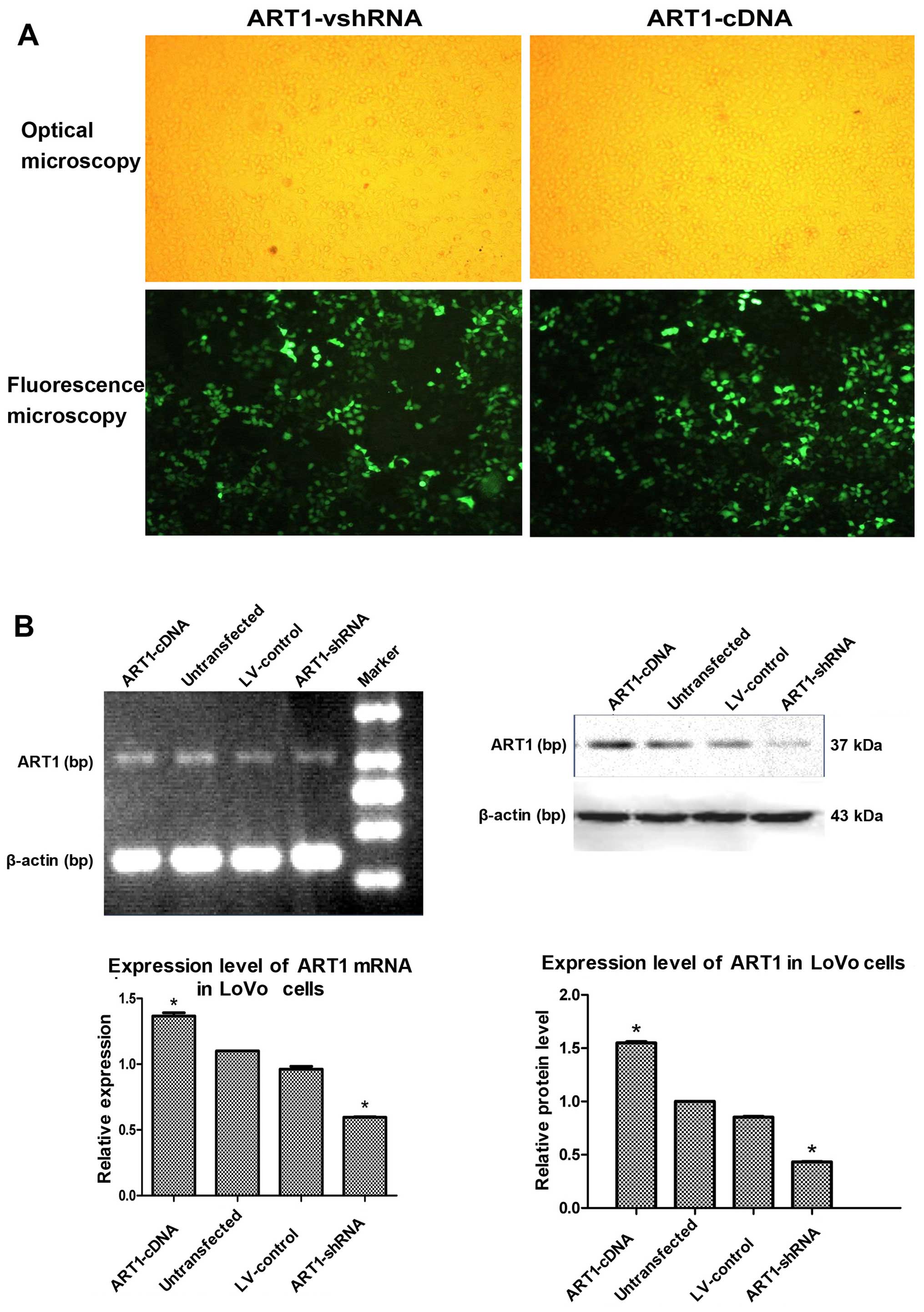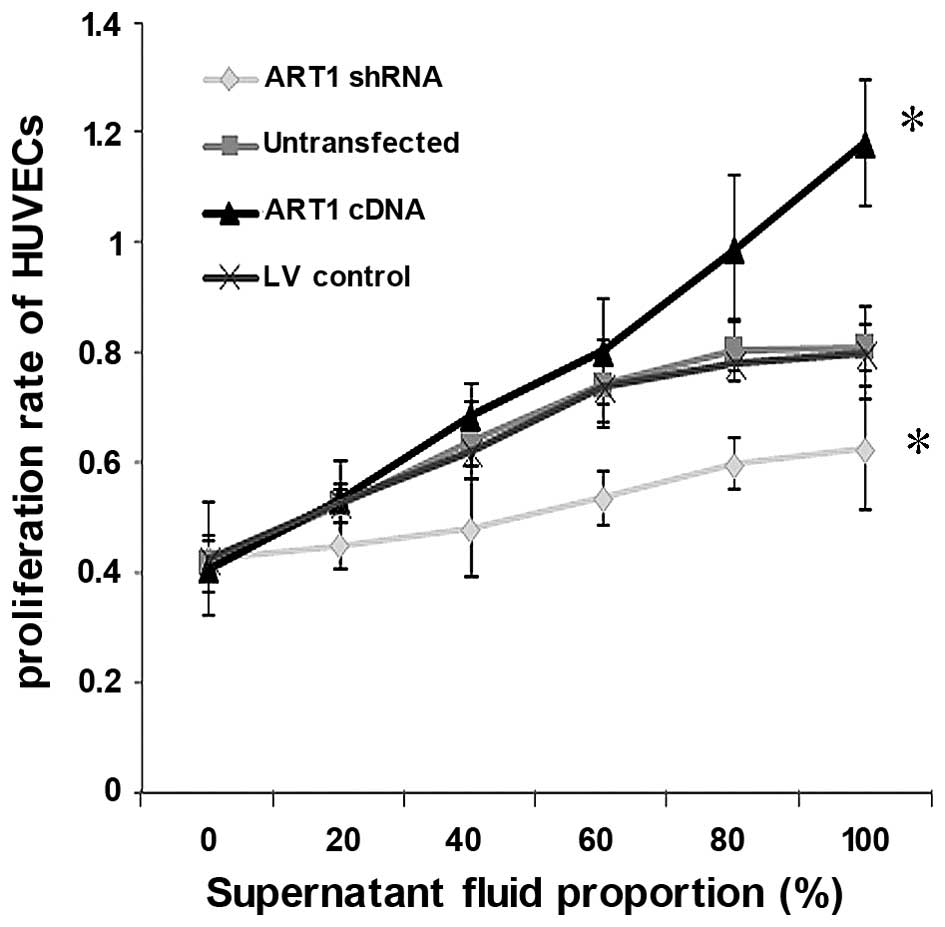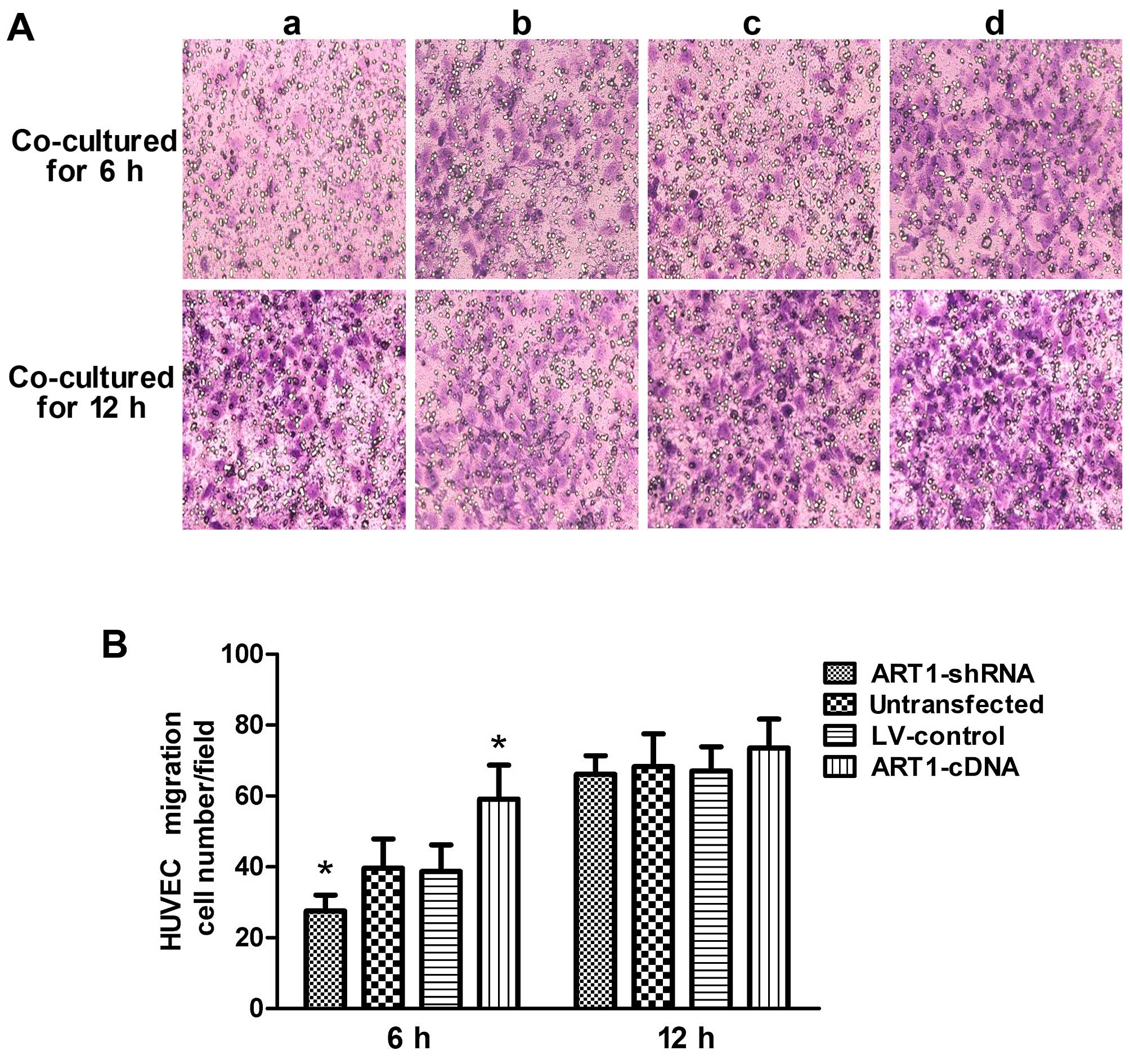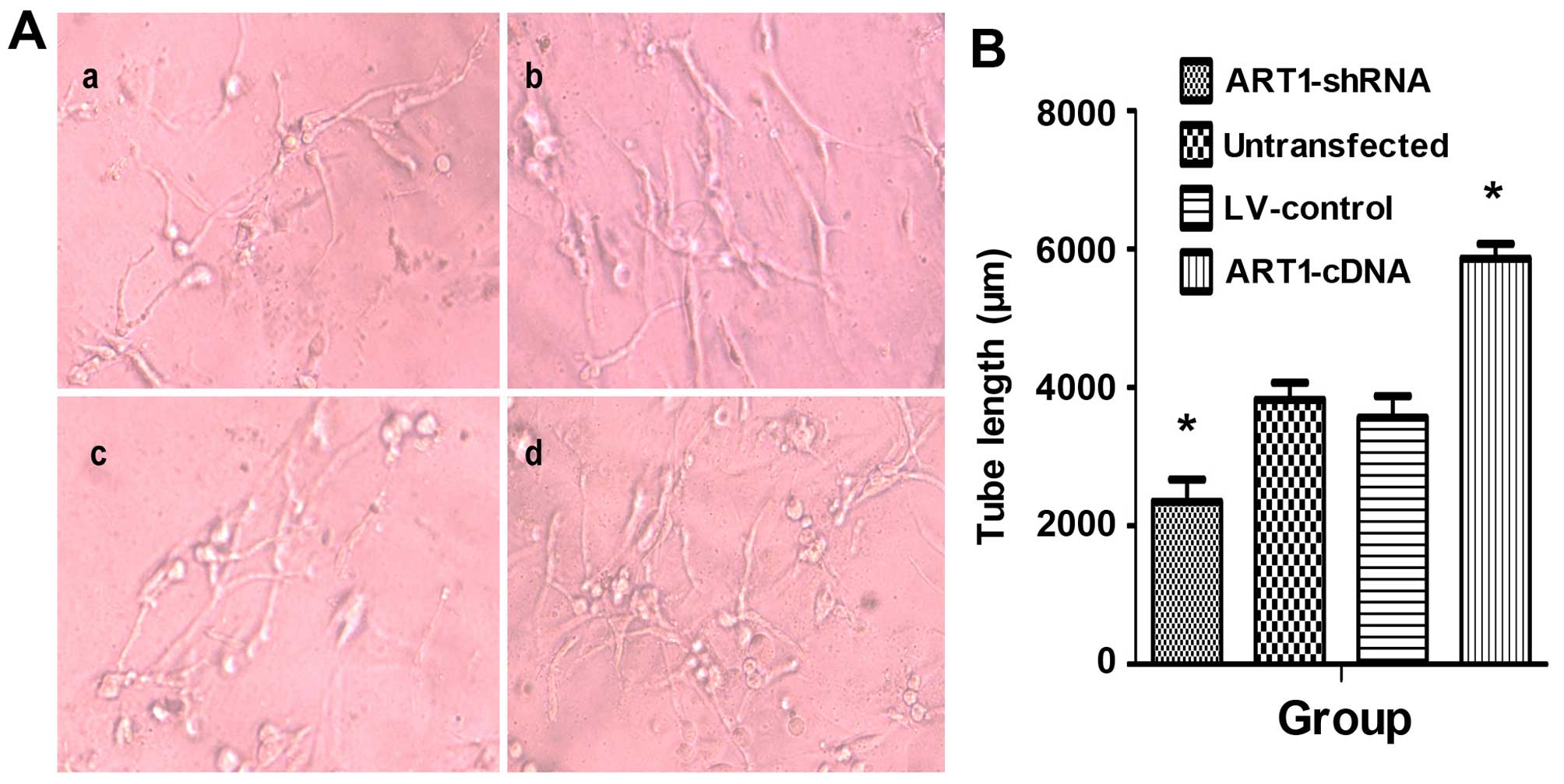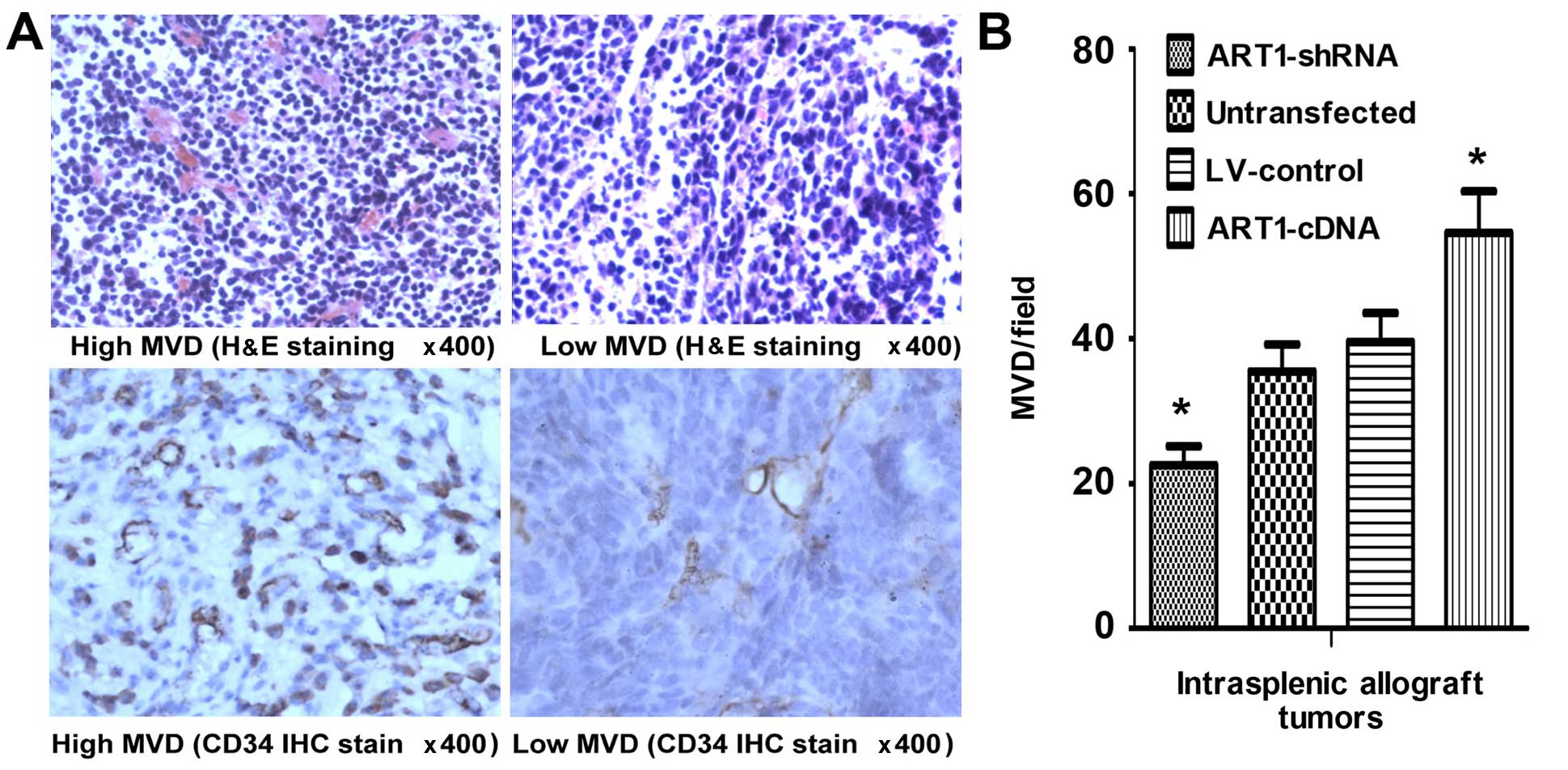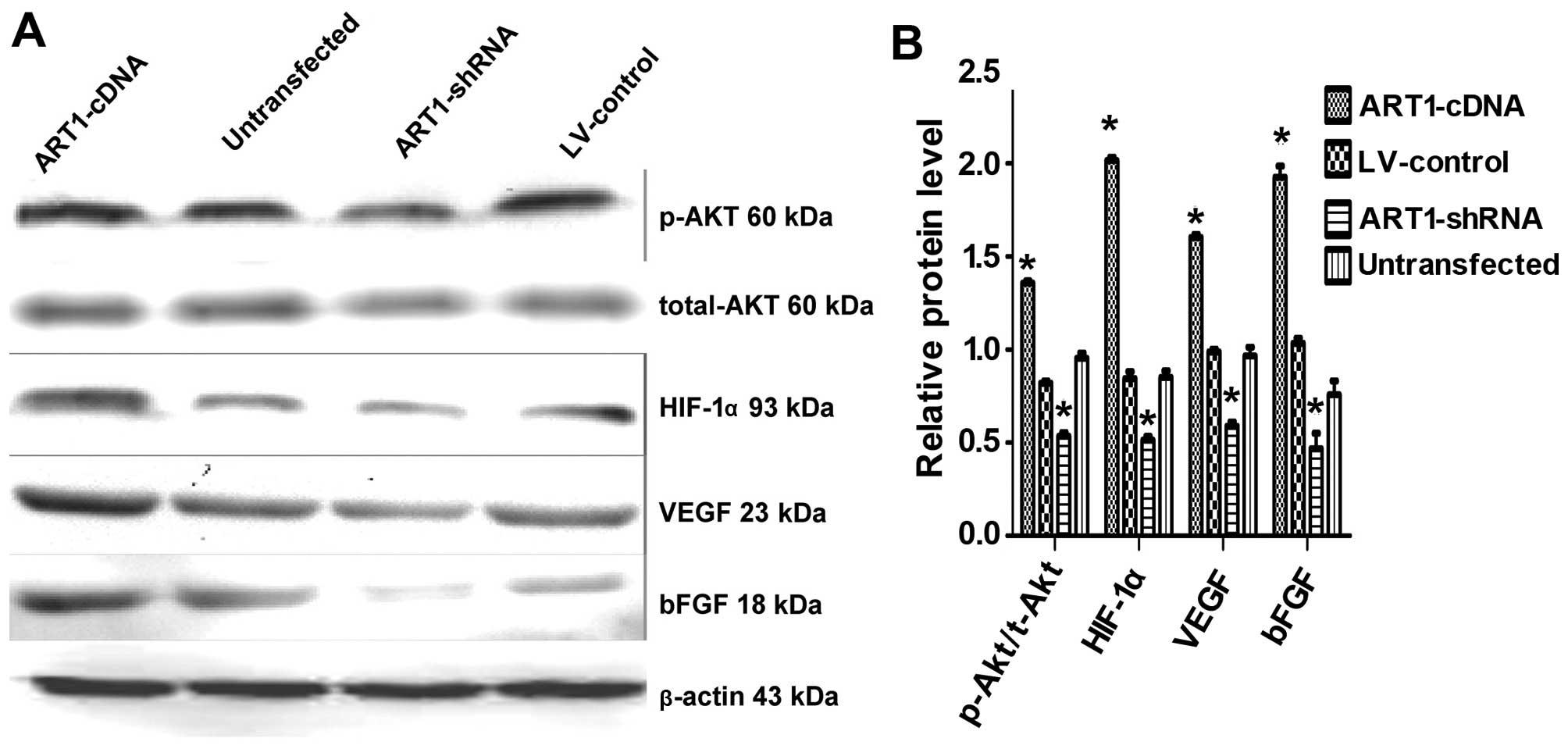|
1
|
Bergers G, Brekken R, McMahon G, Vu TH,
Itoh T, Tamaki K, Tanzawa K, Thorpe P, Itohara S, Werb Z and
Hanahan D: Matrix metalloproteinase-9 triggers the angiogenic
switch during carcinogenesis. Nat Cell Biol. 2:737–744. 2000.
View Article : Google Scholar : PubMed/NCBI
|
|
2
|
Seman M, Adriouch S, Haag F and Koch-Nolte
F: Ecto-ADP-ribosyltransferases (ARTs): Emerging actors in cell
communication and signaling. Curr Med Chem. 11:857–872. 2004.
View Article : Google Scholar : PubMed/NCBI
|
|
3
|
Braren R, Glowacki G, Nissen M, Haag F and
Koch-Nolte F: Molecular characterization and expression of the gene
for mouse NAD+: arginine
ecto-mono(ADP-ribosyl)transferase, Art1. Biochem J. 336:561–568.
1998. View Article : Google Scholar
|
|
4
|
Corda D and Di Girolamo M: Functional
aspects of protein mono-ADP-ribosylation. EMBO J. 22:1953–1958.
2003. View Article : Google Scholar : PubMed/NCBI
|
|
5
|
Okazaki IJ, Zolkiewska A, Nightingale MS
and Moss J: Immunological and structural conservation of mammalian
skeletal muscle glycosylphosphatidylinositol-linked
ADP-ribosyltransferases. Biochemistry. 33:12828–12836. 1994.
View Article : Google Scholar : PubMed/NCBI
|
|
6
|
Kefalas P, Allport JR, Donnelly LE,
Rendell NB, Murray S, Taylor GW, Lo G, Yadollahi-Farsani M and
MacDermot J: Arginine-specific mono(ADP-ribosyl)transferase
activity in human neutrophil polymorphs. A possible link with the
assembly of filamentous actin and chemotaxis. Adv Exp Med Biol.
419:241–244. 1997. View Article : Google Scholar : PubMed/NCBI
|
|
7
|
Balducci E, Horiba K, Usuki J, Park M,
Ferrans VJ and Moss J: Selective expression of RT6 superfamily in
human bronchial epithelial cells. Am J Respir Cell Mol Biol.
21:337–346. 1999. View Article : Google Scholar : PubMed/NCBI
|
|
8
|
Zolkiewska A and Moss J: Integrin alpha 7
as substrate for a glycosylphosphatidylinositol-anchored
ADP-ribosyltransferase on the surface of skeletal muscle cells. J
Biol Chem. 268:25273–25276. 1993.PubMed/NCBI
|
|
9
|
Nemoto E, Yu Y and Dennert G: Cell surface
ADP-ribosyltransferase regulates lymphocyte function-associated
molecule-1 (LFA-1) function in T cells. J Immunol. 157:3341–3349.
1996.PubMed/NCBI
|
|
10
|
Wang J, Nemoto E and Dennert G: Regulation
of CTL by ecto-nictinamide adenine dinucleotide (NAD) involves
ADP-ribosylation of a p56lck-associated protein. J Immunol.
156:2819–2827. 1996.PubMed/NCBI
|
|
11
|
Laing S, Unger M, Koch-Nolte F and Haag F:
ADP-ribosylation of arginine. Amino Acids. 41:257–269. 2011.
View Article : Google Scholar :
|
|
12
|
Saxty BA, Yadollahi-Farsani M, Upton PD,
Johnstone SR and MacDermot J: Inactivation of platelet-derived
growth factor-BB following modification by ADP-ribosyltransferase.
Br J Pharmacol. 133:1219–1226. 2001. View Article : Google Scholar : PubMed/NCBI
|
|
13
|
Kato J, Zhu J, Liu C and Moss J: Enhanced
sensitivity to cholera toxin in ADP-ribosylarginine
hydrolase-deficient mice. Mol Cell Biol. 27:5534–5543. 2007.
View Article : Google Scholar : PubMed/NCBI
|
|
14
|
Del Vecchio M and Balducci E: Mono
ADP-ribosylation inhibitors prevent inflammatory cytokine release
in alveolar epithelial cells. Mol Cell Biochem. 310:77–83. 2008.
View Article : Google Scholar
|
|
15
|
Stevens LA, Levine RL, Gochuico BR and
Moss J: ADP-ribosylation of human defensin HNP-1 results in the
replacement of the modified arginine with the noncoded amino acid
ornithine. Proc Natl Acad Sci USA. 106:19796–19800. 2009.
View Article : Google Scholar : PubMed/NCBI
|
|
16
|
Liu ZX, Yu Y and Dennert G: A cell surface
ADP-ribosyltransferase modulates T cell receptor association and
signaling. J Biol Chem. 274:17399–17401. 1999. View Article : Google Scholar : PubMed/NCBI
|
|
17
|
Akai T, Nabeya Y, Yahiro K, Morinaga N,
Mitsuhashi K, Inoue M, Sakamoto A, Ochiai T and Noda M:
Helicobacter pylori induces mono-(adenosine
5′-diphosphate)-ribosylation in human gastric adenocarcinoma. Int J
Oncol. 29:965–972. 2006.PubMed/NCBI
|
|
18
|
Balducci E, Micossi LG, Soldaini E and
Rappuoli R: Expression and selective up-regulation of toxin-related
mono ADP-ribosyltransferases by pathogen-associated molecular
patterns in alveolar epithelial cells. FEBS Lett. 581:4199–4204.
2007. View Article : Google Scholar : PubMed/NCBI
|
|
19
|
Yang L, Wang YL, Sheng YT, Xiong W, Xu JX,
Tang Y and Li X: The correlation of ART1 expression with
angiogenesis in colorectal carcinoma and its relationship with VEGF
and integrin αVβ3 expressions. J Basic Clin Med. 32:1065–1069.
2012.
|
|
20
|
Fang J, Ding M, Yang L, Liu LZ and Jiang
BH: PI3K/PTEN/AKT signaling regulates prostate tumor angiogenesis.
Cell Signal. 19:2487–2497. 2007. View Article : Google Scholar : PubMed/NCBI
|
|
21
|
Gray MJ, Zhang J, Ellis LM, Semenza GL,
Evans DB, Watowich SS and Gallick GE: HIF-1alpha, STAT3, CBP/p300
and Ref-1/APE are components of a transcriptional complex that
regulates Src-dependent hypoxia-induced expression of VEGF in
pancreatic and prostate carcinomas. Oncongene. 24:3110–3120. 2005.
View Article : Google Scholar
|
|
22
|
Tang Y, Wang Y-L, Yang L, Xu J-X, Xiong W,
Xiao M and Li M: Inhibition of arginine ADP-ribosyltransferase 1
reduces the expression of poly(ADP-ribose) polymerase-1 in colon
carcinoma. Int J Mol Med. 32:130–136. 2013.PubMed/NCBI
|
|
23
|
Yang LP, Cheng P, Peng XC, Shi HS, He WH,
Cui FY, Luo ST, Wei YQ and Yang L: Anti-tumor effect of
adenovirus-mediated gene transfer of pigment epithelium-derived
factor on mouse B16-F10 melanoma. J Exp Clin Cancer Res. 28:75–78.
2009. View Article : Google Scholar : PubMed/NCBI
|
|
24
|
Huang C, Yuan X, Li Z, Tian Z, Zhan X,
Zhang J and Li X: VE-statin/Egfl7 siRNA inhibits angiogenesis in
malignant glioma in vitro. Int J Clin Exp Pathol. 7:1077–1084.
2014.PubMed/NCBI
|
|
25
|
Rajesh M, Mukhopadhyay P, Godlewski G,
Bátkai S, Haskó G, Liaudet L and Pacher P:
Poly(ADP-ribose)polymerase inhibition decreases angiogenesis.
Biochem Biophys Res Commun. 350:1056–1062. 2006. View Article : Google Scholar : PubMed/NCBI
|
|
26
|
Neo JH, Malcontenti-Wilson C, Muralidharan
V and Christophi C: Effect of ACE inhibitors and angiotensin II
receptor antagonists in a mouse model of colorectal cancer liver
metastases. J Gastroenterol Hepatol. 22:577–584. 2007. View Article : Google Scholar : PubMed/NCBI
|
|
27
|
Weidner N, Semple JP, Welch WR and Folkman
J: Tumor angiogenesis and metastasis - correlation in invasive
breast carcinoma. N Engl J Med. 324:1–8. 1991. View Article : Google Scholar : PubMed/NCBI
|
|
28
|
Xiao M, Tang Y, Wang YL, Yang L, Li X,
Kuang J and Song GL: ART1 silencing enhances apoptosis of mouse
CT26 cells via the PI3K/Akt/NF-κB pathway. Cell Physiol Biochem.
32:1587–1599. 2013.
|
|
29
|
Xu JX, Wang YL, Tang Y and Xiong W: RNA
interference of ART1 on colon cancer cell proliferation in mice and
its mechanism. Tumor. 32:949–954. 2012.
|
|
30
|
Wei X, Tang Y, Wang Y and Xu J-X: Effects
of ART1 gene silencing on the ability of CT26 cellular matrix
adhesion and migration. Fudan Univ J Med Sci. 40:328–334. 2013.
|
|
31
|
Imura S, Miyake H, Izumi K, Tashiro S and
Uehara H: Correlation of vascular endothelial cell proliferation
with microvessel density and expression of vascular endothelial
growth factor and basic fibroblast growth factor in hepatocellular
carcinoma. J Med Invest. 51:202–209. 2004. View Article : Google Scholar : PubMed/NCBI
|
|
32
|
Raspollini MR, Castiglione F, Garbini F,
Villanucci A, Amunni G, Baroni G, Boddi V and Taddei GL:
Correlation of epidermal growth factor receptor expression with
tumor microdensity vessels and with vascular endothelial growth
factor expression in ovarian carcinoma. Int J Surg Pathol.
13:135–142. 2005. View Article : Google Scholar : PubMed/NCBI
|
|
33
|
Eriksson K, Magnusson P, Dixelius J,
Claesson-Welsh L and Cross MJ: Angiostatin and endostatin inhibit
endothelial cell migration in response to FGF and VEGF without
interfering with specific intracellular signal transduction
pathways. FEBS Lett. 536:192242003. View Article : Google Scholar
|
|
34
|
Su Y, Guan XQ, Liu FQ and Wang YL: The
effects of MIBG on the invasive properties of HepG2 hepatocellular
carcinoma cells. Int J Mol Med. 34:842–848. 2014.PubMed/NCBI
|
|
35
|
Bondarenko VA and Yamazaki A:
Characterization of argininespecific mono-ADP ribosyltransferase
isolated from frog retina and its function in signal transduction.
Invest Ophthalmol Vis Sci. 50:5440–A391. 2009.
|
|
36
|
Kerbel RS: Tumor angiogenesis. N Engl J
Med. 358:2039–2049. 2008. View Article : Google Scholar : PubMed/NCBI
|
|
37
|
McCubrey JA, Steelman LS, Chappell WH,
Abrams SL, Montalto G, Cervello M, Nicoletti F, Fagone P, Malaponte
G, Mazzarino MC, et al: Mutations and deregulation of
Ras/Raf/MEK/ERK and PI3K/PTEN/Akt/mTOR cascades which alter therapy
response. Oncotarget. 3:954–987. 2012. View Article : Google Scholar : PubMed/NCBI
|
|
38
|
Hart JR and Vogt PK: Phosphorylation of
AKT: a mutational analysis. Oncotarget. 2:467–476. 2011. View Article : Google Scholar : PubMed/NCBI
|
|
39
|
Sheng S, Qiao M and Pardee AB: Metastasis
and AKT activation. J Cell Physiol. 218:451–454. 2009. View Article : Google Scholar
|
|
40
|
Hawkins PT, Anderson KE, Davidson K and
Stephens LR: Signalling through class I PI3Ks in mammalian cells.
Biochem Soc Trans. 34:647–662. 2006. View Article : Google Scholar : PubMed/NCBI
|
|
41
|
Agani F and Jiang BH: Oxygen-independent
regulation of HIF-1: novel involvement of PI3K/AKT/mTOR pathway in
cancer. Curr Cancer Drug Targets. 13:245–251. 2013. View Article : Google Scholar : PubMed/NCBI
|
|
42
|
Semenza GL: HIF-1: Upstream and downstream
of cancer metabolism. Curr Opin Genet Dev. 20:51–56. 2010.
View Article : Google Scholar :
|
|
43
|
Lu X and Kang Y: Hypoxia and
hypoxia-inducible factors: master regulators of metastasis. Clin
Cancer Res. 16:5928–5935. 2010. View Article : Google Scholar : PubMed/NCBI
|
|
44
|
Rohwer N and Cramer T: HIFs as central
regulators of gastric cancer pathogenesis. Cancer Biol Ther.
10:383–385. 2010. View Article : Google Scholar : PubMed/NCBI
|
|
45
|
Kitajima Y and Miyazaki K: The critical
impact of HIF-1α on gastric cancer biology. Cancers (Basel).
5:15–26. 2013. View Article : Google Scholar
|
|
46
|
Lee BL, Kim WH, Jung J, Cho SJ, Park JW,
Kim J, Chung HY, Chang MS and Nam SY: A hypoxia-independent
up-regulation of hypoxia-inducible factor-1 by AKT contributes to
angiogenesis in human gastric cancer. Carcinogenesis. 29:44–51.
2008. View Article : Google Scholar
|
|
47
|
Chun SY, Johnson C, Washburn JG,
Cruz-Correa MR, Dang DT and Dang LH: Oncogenic KRAS modulates
mitochondrial metabolism in human colon cancer cells by inducing
HIF-1α and HIF-2α target genes. Mol Cancer. 9:2932010. View Article : Google Scholar
|
|
48
|
Pugh CW and Ratcliffe PJ: Regulation of
angiogenesis by hypoxia-inducible factor-1: role of the HIF system.
Nat Med. 9:677–684. 2003. View Article : Google Scholar : PubMed/NCBI
|
|
49
|
Lang SA, Gaumann A, Koehl GE, Seidel U,
Bataille F, Klein D, Ellis LM, Bolder U, Hofstaedter F, Schlitt HJ,
et al: Mammalian target of rapamycin is activated in human gastric
cancer and serves as a target for therapy in an experimental model.
Int J Cancer. 120:1803–1810. 2007. View Article : Google Scholar : PubMed/NCBI
|















